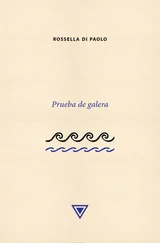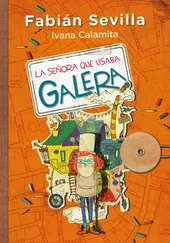Later, at her home, Dália puts Pablo to bed and they watch TV. Assuming that the effect of the acid has passed, he gets ready to have a talk with her, but right then she tugs on his hand and says, My mother isn’t here, let’s go into my room. Pablo won’t wake up, come on. But he just sits there. He says that he doesn’t want to continue the relationship and prefers to be on his own. Idiot, she says, once she has assimilated the information. How can you tell me something like that when I’m high on acid? She gives him a look of profound disappointment and is near tears as she says, Today of all days? After an awesome night? Did it have to be today? He doesn’t know what to say. When is the right time? After a fight? In the middle of the week, when she is busy holding down two jobs? There’s no such thing as the right time. The right time is before things get bad, isn’t it? No, it isn’t! she almost shouts. It’s supposed to get bad first, you idiot. Today of all days? And why? Tell me why. She calms down, sighs, strokes his face, shakes her head. Go home, and we’ll talk later. Please. He gets up and starts to leave. But why? she keeps asking uselessly. Why? I just want to understand why.
• • •
E very three or four days he goes to the Internet café on the main square and checks his e-mails. His in-box is always overflowing with new messages, but generally only two or three are of any interest. A message from the lawyer about a little problem with the probate process. Another from his mother saying that she and her boyfriend are thinking about coming to spend a weekend in Garopaba. He answers that they can stay with him if they want. A former classmate from university is getting married. He replies that he won’t be able to attend the wedding, congratulates him, and uses his credit card to purchase a bread maker from the couple’s gift list on a department store site. Then he reads the four messages in the e-mail list created by Sara for the running group. They have decided that lessons will start at seven instead of seven-thirty so that Denise, Sara’s friend who has joined the group, will have time to run and make it to work on time. He answers with an okay. There is also a private message from Sara saying that they need to talk about the price of the lessons because everyone is asking. He answers that they can discuss it in person another time. Some messages are from previous weeks. Condolences from someone who only just found out that his father died, invitations to compete in triathlons, races, and open-water swimming competitions sent by organizers or people who don’t know he has moved to Garopaba. He recalls that Dália told him off for not answering his Facebook messages. He types in his user name and password and enters the site for the first time in three months. He thinks the layout may have changed. There are dozens of friend requests, and his face in his profile picture is beardless. He scans the names and accepts requests from Dália Jakobczinski, Débora Busatto, who he presumes to be the receptionist from the gym, and Breno Wolff, a friend who swam for União. These are the ones he is able to recognize by name. Then he clicks on the requests from mysterious faces one by one and takes a look at their walls in search of clues. He watches a new Coldplay clip that has just been posted by a blonde whose name doesn’t mean anything to him. He looks at the YouTube suggestions and watches a few more videos. A baby laughing, a clip by a new band called Little Joy, a really impressive compilation of the best moments in professional tennis in 2007. Almost all the terminals around him are occupied by people who are hunched over, engrossed, wearing large headphones. Diagonally opposite him a foreign gentleman in glasses is in the middle of a tense conversation with someone on Skype, shouting emphatically in English and pausing at length to listen to the replies as he holds the arm of the microphone between his thumb and forefinger and keeps his face almost glued to the computer screen, gazing into the depths of a black screen covered in icons. The connection is slow, and he suddenly realizes he has spent more than half an hour watching half a dozen videos. He returns to Facebook and remembers to check his personal messages. Four are from Dália.* He scrolls down the list of messages a little further and finds one sent by Viviane two weeks earlier. He takes his hand off the mouse and stares at the screen. Then he clicks on the message and reads it.*
He suddenly needs to catch his breath and realizes with a fright that he forgot to breathe when he was trying to decide if he should answer it. He takes the mouse again and, clicking quickly, searches his account settings and closes his profile down, ignoring the automatic message saying that his friends are going to miss him.
• • •
I t is raining heavily on Monday morning, and the members of the running group text him to say they aren’t coming. He goes back to bed and sleeps a little longer. He wakes up with the dog lying next to him and gently shoos her away. She climbs back onto the bed again. His dad never used to allow her on beds and sofas, and it is curious that she has started now. He lets her stay there for a while, stroking her back. He falls asleep again and doesn’t wake up until almost noon. He walks to the supermarket in the rain and buys a pound of liver, which he fries up and eats with some leftover pasta and tomato sauce. He gives a slice to Beta, who takes a few seconds to believe she has been given something other than dry dog food. He gets dressed for the gym. Before he leaves, the dog barks three times for no reason and looks as if she is waiting for a reply. Do you want out? Want to stay? he asks. She decides she wants out when he starts to close the door and comes running behind his bicycle. The old dog’s energy never fails to surprise him. She lags behind somewhat but always catches up and flops to the ground to rest whenever she gets the chance. Sometimes she disappears for minutes or hours but is always nearby when he returns home.
The cold has already frightened some of his students away from the pool. The Rastafarian and the rheumatologist didn’t last the first month. Others are still going strong. Tiago has visibly lost weight, learned to do flip turns, and can already maintain regular times in his sets of fifty and one hundred meters. The twins are starting to loosen up, and today they show him a dance they have rehearsed. They gyrate, twist their wrists, and flick their hair around by the edge of the pool as Tina Turner’s “Proud Mary” plays on one of their cell phones. As soon as they enter the water, they become serious again and swim with their characteristic stoicism. Every time he sees them, he has to ask which of them is Rayanne and which is Tayanne. They try to trick him, but he figures it out as soon as they start swimming, because they kick their legs differently. Tayanne bends her knees too much and can’t point her toes, which is why she tends to be left behind by her sister. Late in the afternoon he manages to convince Ivana to learn to swim butterfly, which a doctor forbade her to do many years ago because of her swayback. If they take it slowly, he doesn’t think she’ll have any problems.
He eats a piece of orange cake while talking to Mila, the Chilean from the snack bar, and goes to pick up Pablito from school as always. The clouds have lifted somewhat, and he can see the moon on the wane. He stands there waiting for the boy to run up to him at the gate, but he doesn’t. After a few minutes a teacher notices and walks over. Dália has already picked him up. He calls her.
I clocked off early in Imbituba and went to get him. I didn’t have any choice. I still haven’t worked out what to do.
But, Dália, I can keep picking him up.
Yeah, right. Listen here. You can’t go around playing with my son’s expectations. Or my feelings. Don’t you get these things? What are you doing there? You haven’t called me or said anything. I don’t understand you. You—
Читать дальше












